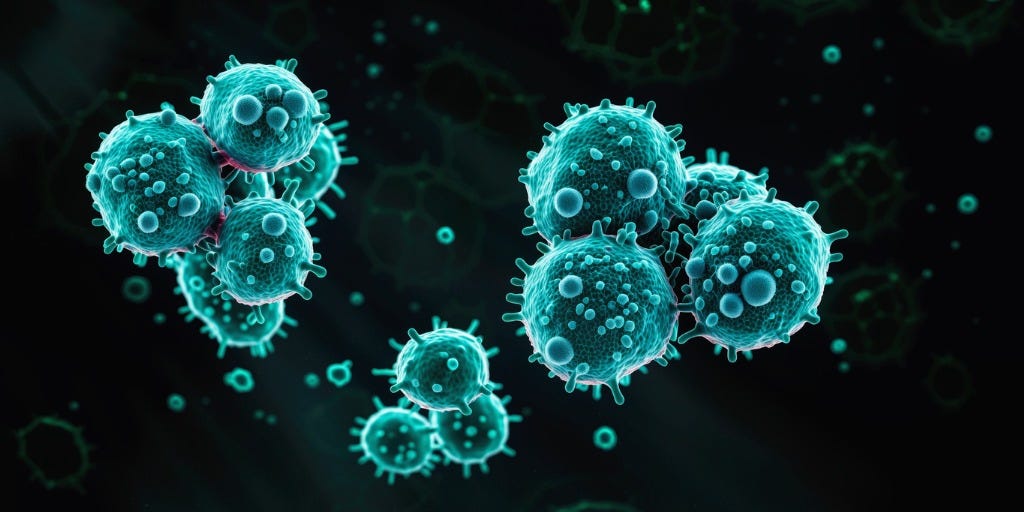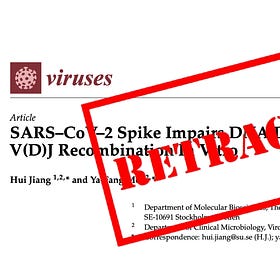Two new studies suggest mRNA Covid vaccines can contribute to cancer formation
A new preprint provides evidence that the spike protein of both SARS-CoV-2 and mRNA vaccinations inhibits an important tumor suppressor protein, which may lead to increased incidence of cancer.
The preprint, titled ‘SARS-CoV-2 spike S2 subunit inhibits p53 activation of p21(WAF1), TRAIL Death Receptor DR5 and MDM2 proteins in cancer cells,’ and published on 15 April, is authored by Brown University Professors Shengliang Zhang and Wafik El-Deiry. The latter is the Director of the Cancer Centre at the University.
The scientists set out to determine if the S2 component of the SARS-CoV-2 spike protein interacts with a tumor suppressor protein called p53. This particular protein is called the ‘guardian of the genome’ for its important role in DNA damage response and repair.
The authors found that S2 had a suppressive effect on p53, which suggests that “the SARS-CoV-2 spike causes an altered DNA damage sensing and repair response in cancer cells.”
In turn, this finding “provides a potential molecular mechanism by which SARS-CoV-2 infection may impact tumorigenesis, tumor progression and chemotherapy sensitivity.”
In other words, a component of the SARS-CoV-2 spike protein can lead to the development of tumors and may inhibit positive effects of cancer therapeutics.
Significantly, the authors note that this finding has implications for mRNA vaccines too, which instruct your body to make the very same spike protein as the wild SARS-CoV-2 spike protein. The authors write,
"Our results have implications for the biological effects of spike S2 subunit in human cells whether spike is present due to primary COVID-19 infection or due to mRNA vaccines where its expression is used to promote anti-viral immunity."
Polymath Dr Jessica Rose has already offered a brief take in a post fittingly titled, ‘S2 of SARS-2 spike buggers up p53.’
This new preprint confirms earlier findings. A peer-reviewed article, ‘S2 Subunit of SARS-nCoV-2 Interacts with Tumor Suppressor Protein p53 and BRCA: an In Silico Study,’ published in the journal Translational Oncology in October 2020 claimed to be the first to report the interaction between S2 proteins with tumor suppressor proteins p53 and BRCA-1/2.
Another peer-reviewed study published in the journal Viruses in October 2021 found that the SARS–CoV–2 spike protein significantly inhibited DNA damage repair by impeding key DNA repair proteins BRCA1 and p53 recruitment to the damage site.
The paper titled ‘SARS–CoV–2 Spike Impairs DNA Damage Repair and Inhibits V(D)J Recombination In Vitro’, was authored by scientists Hui Jiang and Ya-Fang Mei.
Similar to Zhang & El-Deiry, the authors of this study concluded that this finding would apply to the virus spike as well as the vaccine spike, stating,
“Our findings reveal a potential molecular mechanism by which the spike protein might impede adaptive immunity and underscore the potential side effects of full-length spike-based vaccines.”
This may have been the right scientific conclusion to draw at the wrong time. The paper was retracted in May 2022 under strange circumstances, a move that appeared to be politically motivated. Arkmedic covered this paper and the scandal surrounding its retraction in a post, ‘Welcome to Gilead.’
Two years on, and coming from established professors at Brown University, the Zhang & El-Deiry paper is unlikely to suffer the same fate.
As the Jiang & Mei paper is now retracted, I have attached a PDF.
UPDATE: The Zhang & El-Deiry paper passed through peer-review to be published in the journal Oncotarget on 3 May 2024.
The scandal of the Jiang & Mei paper retraction has been exposed in a bombshell report. Mei claims the retraction was “forced” in “violation of ancademic ethics” and emails obtained under FOIA show external pressure to falsely discredit the study.
EXCLUSIVE REPORT: Forced retraction of Covid vaccine cancer-risk study, scientist alleges
Explosive new evidence uncovered in a two-years long investigation reveals that one of the authors of a retracted paper revealing the Covid vaccines’ potential to cause cancers never agreed to its retraction, which she now claims was “forced” in “violation of academic ethics.” Emails obtained under FOIA corroborate her story.
The other new paper of interest is a cancer modelling review which concludes that 100% pseudouridinated mRNA is potentially cancer-promoting and should not be used in new mRNA therapeutics.
From the paper, titled ‘Review: N1-methyl-pseudouridine (m1Ψ): Friend or foe of cancer?’, by biologist Alberto Rubio-Casillas and colleagues, and published in the International Journal of Biological Macromolecules on 5 April 2024,
“Evidence is provided that adding 100 % of N1-methyl-pseudouridine (m1Ψ) to the mRNA vaccine in a melanoma model stimulated cancer growth and metastasis, while non-modified mRNA vaccines induced opposite results, thus suggesting that COVID-19 mRNA vaccines could aid cancer development. Based on this compelling evidence, we suggest that future clinical trials for cancers or infectious diseases should not use mRNA vaccines with a 100 % m1Ψ modification, but rather ones with the lower per- centage of m1Ψ modification to avoid immune suppression.
This paper came to my attention by way of Dr Peter McCullough. In a substack post discussing the paper, Dr McCullough highlights that the same technology that landed its creators a Nobel Prize in 2023 potentially renders mRNA therapeutics oncogenic.
I admit that I am nervous about modelling studies ever since Imperial College London showed the world how badly they can be abused. To underscore the point, a reader brought an ABC news article about a new modelling study to my attention this morning, which claims that computer simulation suggests that the Covid vaccine program prevented thousands of deaths. You can view the study here.
The Rubio-Casillas paper is paywalled, so I have attached a PDF.
Lastly, I will reshare an article by professor of oncology Angus Dalgleish summarising the research on oncogenic features of the Covid vaccines (the mRNAs specifically) to date. In ‘The covid booster cancer time bomb’, Prof Dalgleish details four mechanisms identified in the scientific literature by which Covid vaccines could lead to an increase in cancers:
Suppression of T cell responses after boosters (but not the first two injections)
To support my work, share, subscribe, and/or make a one-off contribution to DDU via my Kofi account. Thanks!



